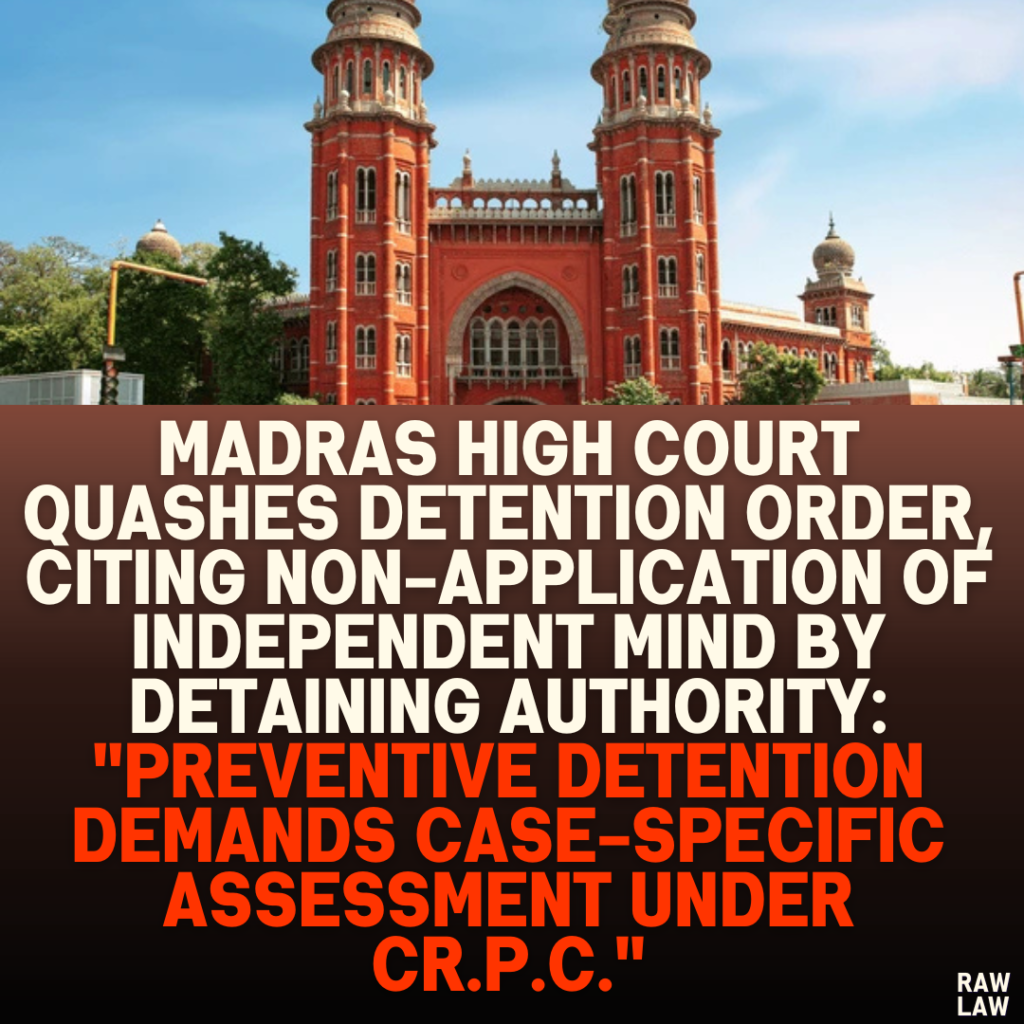Court’s Decision:
The Madras High Court quashed the detention order issued by the detaining authority (the Commissioner of Police, Coimbatore), under which the petitioner’s son had been detained. The court held that the detention order was issued without proper consideration of relevant facts, notably the inappropriate reliance on a prior bail order.
Facts:
The case concerned a petition filed under Article 226 of the Indian Constitution, challenging the detention of the petitioner’s son under a preventive detention order issued on 08.08.2024. The petitioner argued that the detention order was based on an incorrect interpretation of a similar bail order which was used by the detaining authority as justification for the detention.
Issues:
The main issue was whether the detention order was issued with due application of mind, especially concerning the validity and relevance of the bail order cited by the detaining authority as the basis for preventive detention.
Petitioner’s Arguments:
The petitioner argued that the detention order was grounded on an unrelated bail order granted in a previous case under Section 167(2) of the Criminal Procedure Code (Cr.P.C.). The petitioner contended that this prior bail order had no direct application to the present case, as the grounds for statutory bail in the two cases were dissimilar. Consequently, the petitioner asserted that the detention was unlawful and constituted a violation of due process.
Respondent’s Arguments:
The respondents, represented by the Additional Public Prosecutor, maintained that the detention was justified as a preventive measure. However, the court found that the detention authority had erred in equating the current situation with a prior bail situation, failing to account for distinct legal and factual differences.
Analysis of the Law:
The court examined the legal requirements for issuing a preventive detention order, emphasizing the need for the detaining authority to apply mind thoroughly to the unique facts of each case. Section 167(2) Cr.P.C. provides for statutory bail under specific conditions, and misapplying this provision in unrelated cases undermines the legitimacy of preventive detention orders.
Precedent Analysis:
The court referenced general principles established in previous judgments on preventive detention, which stress the necessity of individualized reasoning and the inadmissibility of a ‘one-size-fits-all’ approach to detention based solely on unrelated bail orders.
Court’s Reasoning:
The court found that the detaining authority had failed to apply its mind adequately by relying on an inapplicable bail precedent. The court observed that preventive detention requires an independent assessment of the current factual scenario and cannot simply rely on earlier orders unless they are directly pertinent to the case at hand.
Conclusion:
The Madras High Court concluded that the detention order was unsustainable in law due to a lack of application of mind by the detaining authority. Accordingly, the detention order was set aside, and the court directed the immediate release of the detainee unless detained under any other case.
Implications:
This judgment reinforces the principle that preventive detention orders must be based on a clear and individualized rationale specific to each case. It serves as a reminder for detaining authorities to avoid blanket reliance on prior bail orders without assessing their relevance to the current detention, ensuring that preventive measures adhere strictly to due process.
